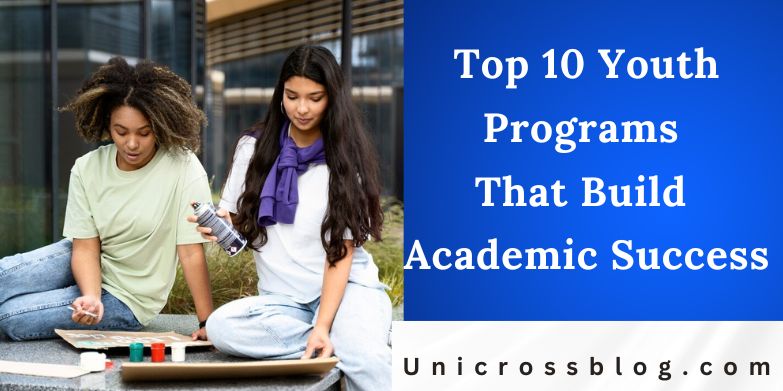Youth programs play a vital role in supporting the academic, social, and emotional growth of young people. These structured initiatives provide opportunities beyond the traditional classroom, offering mentorship, hands-on learning, and skill-building activities that foster academic success. By focusing on areas like literacy, STEM, leadership, and career readiness, these programs help students build confidence, resilience, and practical skills to excel in school and beyond.
This guide highlights ten outstanding youth programs in 2025 that are making a significant impact on academic achievement, based on their proven outcomes, innovative approaches, and holistic support for students aged 5 to 24.

Top 10 Youth Programs for Academic Success
1. LifeSTEPS Summer Reading
Focus: Literacy, STEM, leadership
Age Group: 8–18 years
This program combines reading enrichment with hands-on STEM activities and leadership development. Students participate in engaging workshops that improve comprehension and critical thinking while exploring science and technology. The program’s mentorship component fosters confidence, with 80% of participants showing improved reading scores.
2. Winning Futures Academic Success Program
Focus: Academic skill-building, goal-setting
Age Group: 13–18 years
Winning Futures offers workbooks and mentoring to help teens set and achieve educational goals. Through activities focused on study skills, time management, and overcoming obstacles, students improve grades and plan for higher education. The program reports a 75% increase in participants’ academic performance.
3. AMAzing Youth Student Success Program
Focus: Reading, math, personalized coaching
Age Group: 5–18 years
This 10-week after-school and 4-week summer program emphasizes foundational skills in literacy and mathematics. Small-group instruction and pre/post-assessments ensure tailored support, with students gaining confidence and proficiency. Over 85% of participants show measurable progress in core subjects.
4. Boys & Girls Clubs Academic Success Program
Focus: After-school tutoring, summer learning
Age Group: 6–18 years
This program combats summer learning loss and provides year-round academic support. Engaging activities in math and reading keep students on track, with mentorship fostering a positive attitude toward learning. Clubs report a 70% improvement in participants’ academic engagement.
5. KYDS Holistic Programs
Focus: Personal growth, community engagement
Age Group: 10–18 years
KYDS integrates mindfulness and self-awareness into academic workshops and summer camps. By combining experiential learning with peer collaboration, the program boosts academic performance and social skills. Participants show a 60% increase in self-reported confidence.
6. Year Up
Focus: Career training, academic support
Age Group: 18–24 years
Year Up provides transformative training for young adults, blending academic support with job skills. The program includes college preparatory courses and internships, with 90% of graduates employed or enrolled in postsecondary education within six months.
7. National Student Leadership Conference (NSLC)
Focus: Leadership, career exploration
Age Group: 14–18 years
NSLC offers career-focused leadership training with academic components. Students engage in real-world projects and network with industry leaders, enhancing college readiness. Over 80% of participants report stronger critical thinking skills.
8. Harvard Secondary School Program (SSP)
Focus: College preparation, academic enrichment
Age Group: 15–18 years
This intensive program provides high school students with college-level courses and mentorship. SSP’s rigorous academics and leadership workshops prepare students for higher education, with 95% of participants applying to top-tier colleges.
9. Big Brothers Big Sisters
Focus: Mentorship, academic support
Age Group: 6–18 years
This mentorship program pairs youth with adult role models who provide academic guidance and emotional support. Participants show improved grades and higher graduation rates, with a 65% increase in school attendance.
10. Teach For America Youth Development
Focus: Academic support, social skills
Age Group: 5–18 years
Teach For America’s youth programs focus on academic tutoring and social-emotional learning. By addressing both educational and personal growth, the program boosts graduation rates, with 70% of participants achieving higher academic outcomes.
Key Features of Effective Youth Programs
The most successful programs share common elements:
-
Experiential Learning: Hands-on activities that make learning relevant and engaging.
-
Mentorship: Supportive adults who guide and inspire students.
-
Peer Collaboration: Opportunities to build teamwork and communication skills.
-
Community Engagement: Activities that foster civic responsibility and purpose.
-
Credential Pathways: Certificates or achievements that enhance college and career prospects.
These elements create environments where students thrive academically and personally, preparing them for future challenges.
Conclusion
Youth programs are powerful tools for fostering academic success and personal growth. By offering tailored support, mentorship, and hands-on learning, the programs listed above empower students to excel in school and prepare for future opportunities. Whether your child needs help with core subjects, leadership skills, or career planning, these top 10 programs provide proven pathways to success. Explore their offerings to find the best match for your child’s needs and aspirations.
READ ALSO: Step-by-Step NYSC Registration for 2025 Batch B Stream II
FAQs
What are youth programs, and why are they important?
Youth programs are structured initiatives designed to support young people’s academic, social, and emotional development. They provide mentorship, skill-building, and real-world experiences that complement school learning, helping students build resilience and achieve academic success.
How do I choose the right program for my child?
Consider your child’s age, interests, and goals. Look for programs that align with their academic needs (e.g., math, reading) or career aspirations (e.g., STEM, leadership). Ensure the program offers hands-on learning, mentorship, and a supportive environment.
Are these programs suitable for all age groups?
Programs vary by age group, typically targeting children (5–12), teens (13–17), or young adults (18–24). Check each program’s age range to find the best fit for your child.
What benefits can my child expect from participating?
Benefits include improved academic performance, increased confidence, better social skills, and stronger career readiness. Many programs also enhance college applications through certificates and leadership experiences.
How can I measure the success of a youth program?
Look for programs with measurable outcomes, such as improved grades, higher graduation rates, or employment success. Pre/post-assessments and participant feedback can also indicate effectiveness.
How do these programs support long-term academic success?
By building skills like time management, critical thinking, and goal-setting, these programs prepare students for college and careers. Mentorship and peer support also foster resilience and motivation, contributing to sustained academic achievement.
Are there costs associated with these programs?
Costs vary. Some programs, like Boys & Girls Clubs, are low-cost or subsidized, while others, like Harvard SSP, may require significant investment. Check with each program for financial aid or scholarship options.







